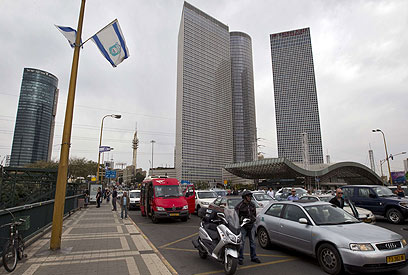
Mayor Huldai
צילום: מוטי קמחי
Favoring Tel Aviv's techies
Mayor says city now catering for hi-tech professionals, but what about the rest?
The Wall Street Journal recently ran an article that identified Tel Aviv as "Europe's main technology hub," saying that Israel's business and culture urban center eclipses European competitors like Berlin and London. The article argued that it was Tel Aviv's longstanding mayor, Ron Huldai, who has been largely responsible for creating the "Silicon Wadi."
This may be true, but a larger socioeconomic question surrounds the oasis of digital wealth that's amassing in Tel Aviv. In an interview with the Journal, Huldai explained his success in making Tel Aviv into a global tech destination, saying, "Tel Aviv had become a city that people used, not a city they lived in. We are creating a good place for hi-tech people to live in - I am doing it for the people working in hi-tech."
With ultra-luxury high-rises rising above the city, built and branded by international design figures like Philippe Starck and Richard Meir, and startups occupying scores of its renovated Bauhaus buildings, it's clear that Huldai's plan is taking shape.
The question many Tel Aviv residents are asking is what Mayor Huldai is doing for the non-hi-tech population. For the past decade, roughly the length of Mr. Huldai's tenure, Tel Aviv has been known for its sky-high prices, including a prohibitively expensive housing market, that have sent younger residents packing off to neighboring suburbs.
Public transportation atrocious
But beyond the quantitative questions related to standard of living, there are qualitative ones well. Israel's Ministry of the Environment announced this month that it would be taking over control of Tel Aviv's pollution control plans, since the city has exceeded pollution limits for the past 10 years, despite an improving trend.
Public transportation within Tel Aviv and between neighboring cities is also woefully inadequate. A six-kilometer (roughly four-mile) bus ride between central Tel Aviv and central Ramat Gan takes a staggering hour and a half on the most direct bus line available. The 15 km ride from central Tel Aviv to Herzliya, another Israeli hi-tech hub, takes at minimum an hour by bus, compared with just over 15 minutes by car.
In response to many of these problems, the municipal government claims the issue is either being addressed, often by "long-term planning," or is a matter for the national government. But with Huldai's success in advocating for the hi-tech-set evident in luxury towers rocketing skyward, middle class Tel Avivians might wonder about the changes that could be made if the perennial mayor put as much effort into making the city as attractive for them as he has put into attracting the techies.
On one point, though, Huldai is undoubtedly wrong: Tel Aviv was not a place that, before his hi-tech transformation, people merely "used." Founded as a garden suburb for members of the middle class, who mostly worked in neighboring Jaffa, it was a place they lived in and enjoyed together - not an overpriced urban playground catered to the technorati.
Ashley Rindsberg is the author of Tel Aviv Stories. He lives in Tel Aviv
Follow Ynetnews on Facebook











